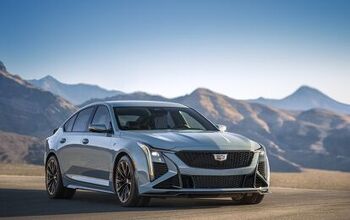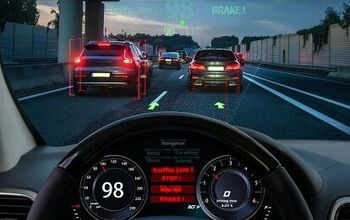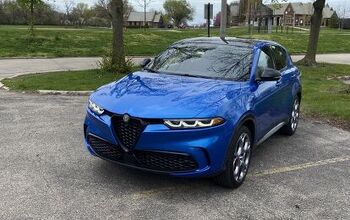Opinion: GM Shooting Itself in Foot By Killing Chevrolet Malibu

The Chevrolet Malibu is dead.
Or, at least, it will be come November.
This despite the fact that the sedan was the third-best selling Chevrolet, behind only the Equinox and Silverado.
On the other hand, Q1 sales for the car were down 13 percent year-over-year. And I am sure some Malibus were being bought by fleets, not Joe and Jane down the street.
Either way, I think the fact that Chevrolet will not, at least for a while, have a sedan on offer is a bad decision.
I could understand if the Malibu was really slow-selling -- it was no surprise when Subaru axed the Legacy, for example. But given that it was one of the better-selling Chevys, I am scratching my head a bit.
Sure, the current Malibu is a bit behind the competition -- most car reviewers would place it behind the segment stalwarts from Honda and Toyota, and clearly most buyers have, too -- but it is still affordable and fuel efficient.
I know, I know, crossovers are king right now -- but there is still demand for sedans. Yet GM seems content to let Honda, Toyota (which has a new Camry launching), and Hyundai/Kia compete for sedan buyers.
Ford and Stellantis have mostly exited the space, too. And to be fair to GM, you can still get a Cadillac in sedan form.
We've been told that OEMs are killing sedans because it's cheaper to build crossovers, and since crossovers are in high demand, automakers can charge more for them.
That second part is true, and the first part definitely applies to body-on-frame SUVs. However, it's not clear if unibody crossovers, many of which share platforms with current or currently dead sedans, are cheaper to build. Robby DeGraff, Manager, Product and Consumer Insights at AutoPacific, tells me that unibody crossovers may cost slightly more to build than cars, but not a lot.
The problem I have with the culling of sedans is the short-sightedness. Yes, crossovers are hot and yes they can make OEMs money. But even if sedans are no longer the dominant family car, some people still prefer them, for a variety of reasons. It may be improved fuel economy or ride and handling. Some folks don't want to climb up into a taller vehicle. Some folks just would rather spend less money than a crossover might command.
So, why not keep an entry in the class? Especially at a reasonable price? Especially since sedans could be an entry into the brand family for someone who might later switch to a crossover?
Think of it this way -- some Malibu buyers were probably young professionals buying their first new car. Some of those folks may have switched to, say, an Equinox when it came time to start a family.
So Chevrolet now cedes the sedan market to Honda and Toyota while also hoping the (admittedly very good) Trax crossover is the gateway to the brand. Seems silly to me.
I understand that businesses want to turn a profit. I am not suggesting automakers continue to build slow-selling models just because some of us would prefer to drive those types of models. I understand that, with the exception of low-volume niche models (think performance cars), demand matters.
What gets my goat is that it seemed like demand for the Malibu was strong enough to justify its continued existence -- and I think overall sedan demand is still strong enough that most full-line automakers should probably have an entry or two available, despite minor sales slides in Q1 this year. I think those that those who don't are harming their long-term health for short-term profit.
Maybe I am wrong. I am paid to give my (as informed as possible) opinion of the industry, and I am not paid by GM to sit in the kind of meetings that determine the fate of cars like the Malibu. Maybe GM has internal data that suggests Chevy will be just fine without the Malibu. Maybe I am wrong about the amount of demand for sedans exists among consumers.
Surely, the Accord and Camry move well based on history, as well -- both cars have been popular for a long time. The Accord has long held a rep as being a family car that's fun to drive, while the Camry has won folks over by being very good at the job of basic transportation. Both companies also have reputations for reliability and fuel efficiency. That matters to shoppers.
The Malibu wasn't quite as fun to drive, nor did it have stylish looks. And Chevy's reputation for reliability, fair or not, isn't on par with Honda and Toyota.
Chevrolet could've rectified this by making a better Malibu. Instead, it will throw up its hands and say "all anyone wants is a crossover, so let's save some bucks by not offering any family cars".
Financially, that approach will likely work in the short term. But again, the company is ceding a part of the market to its competitors instead of, you know, at least trying to fight for sales. It's missing an opportunity to bring more folks into the Chevy brand.
Finally, given the lead times to develop a new vehicle (3-5 years), GM and Chevrolet may find themselves flat-footed should the crossover craze fizzle and folks flock back to sedans.
Or if the Chinese come to our market with well-built, affordable sedans -- most of which would be EVs. It's as if GM has forgotten how Honda and Toyota came into the U.S. with mid-size and compact cars that were worlds better than anything Detroit built, thus knocking the domestics onto their heels for a long time. It took until 2008 for Chevrolet to have a decent mid-size -- that was, of course, the seventh-gen Malibu.
I admit my anger is at more than just Chevy/GM here. I am still smarting over the loss of the Ford Fusion, which looked great and drove well -- it's only real flaw was a lack of rear headroom. The last Focus was a good compact four-door with a killer performance trim.
Meanwhile, Stellantis never did get the mid-size segment right, though the last Chrysler 200 tried.
It's as if the Detroit Three would rather not build compact or mid-size sedans than make the effort to make them competitive with the Japanese and Koreans -- and Volkswagen's Jetta. And soon, perhaps, the Chinese.
That might look good to certain people at the moment. But I think perhaps the Detroit Three would be better off spending the resources to put solid efforts into every major segment instead of the current strategy of putting all their efforts into trucks, crossovers, and niche performance cars. Potential sales are being left on the table. Sometimes spending money is necessary to make money.
Short-term thinking has too often been a problem with American automakers. It's sad to see it happening again.
[Images: Chevrolet/GM]
Become a TTAC insider. Get the latest news, features, TTAC takes, and everything else that gets to the truth about cars first by subscribing to our newsletter.

Tim Healey grew up around the auto-parts business and has always had a love for cars — his parents joke his first word was “‘Vette”. Despite this, he wanted to pursue a career in sports writing but he ended up falling semi-accidentally into the automotive-journalism industry, first at Consumer Guide Automotive and later at Web2Carz.com. He also worked as an industry analyst at Mintel Group and freelanced for About.com, CarFax, Vehix.com, High Gear Media, Torque News, FutureCar.com, Cars.com, among others, and of course Vertical Scope sites such as AutoGuide.com, Off-Road.com, and HybridCars.com. He’s an urbanite and as such, doesn’t need a daily driver, but if he had one, it would be compact, sporty, and have a manual transmission.
More by Tim Healey
Latest Car Reviews
Read moreLatest Product Reviews
Read moreRecent Comments
- Jrhurren The EV haters would keep complaining until prices hit $0, at which point they would proceed to complain some more.
- Kwik_Shift_Pro4X Remember the Mitsubishi Pajero? 😆
- Macca Judging by the atrocious reliability record and general lemony snicket nature of the ICE Wagoneer and GC, this makes about as much sense as the electrically-challenged Brit marques going EV. Upper trim interiors on the GW & GC are a case of 'nice at 10 paces' (or glammed up press photos). In person there are low-rent plastics throughout at critical touch points (center tunnel, seat & mirror controls on the door panel, for instance) where there is unnerving flex akin to a toy. Adding more screens when the main Uconnect screen is already flaky doesn't bode well.
- Ted Bryant HA! Taught my son on my 84 FJ60. One day coming home from baseball we drove some of his friends home. One kid in the back asked how to put the window down. I thought he was joking -- he never "rolled down" a window before.
- Jeff I don't believe that a teenager should have a brand new vehicle nor should they be driving a really old vehicle. Most teenagers will not fully appreciate being given a brand new vehicle and need to learn that there is a responsibility to owing and driving a vehicle. An older vehicle especially one that is very old lacks the safety equipment that newer ones have.





































Comments
Join the conversation
Another Model 3 victim.
BTW, GM sold 130,342 Malibu's in 2023, up from 115,467 in 2022. They can't make a profit on that volume?